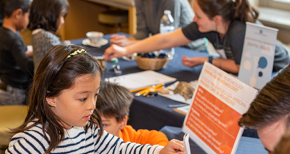While all archaeologists have an ethical obligation to include the public in their work, these organizations aim to improve society's relationship with archaeological resources through dedicated study of public dialogue, community outreach, technological research, and policy development.
Archaeological Research Institute
A non-profit organization that promotes hands-on educational opportunities and an appreciation of the archaeological heritage in the Southeast Indiana, Southwestern Ohio and Northern Kentucky areas.
Archaeology In the Community
A
not-for-profit organization that “promotes and facilitates the study
and public understanding of archaeological heritage” with informal
educational programs, hands-on learning, professional development, and
community events.
The Center for Public Archaeology at Hofstra University
The Center for Public Archaeology works with Hofstra students and the greater community
to think critically about the relationships between the past and present
and the experience of place on Long Island, focusing on the the
archaeology of poor and marginal people, such as enslaved and free
African Americans, historic Native Americans, and others.
The Center for Heritage Resources Studies at the University of Maryland
Associated
with the University of Maryland, this program is dedicated to
“responsible heritage development.” The program brings scholars and
practitioners together to support a comprehensive approach to the study
of heritage, especially the relationship between heritage and the
environment.
Center for American Archeology
A
not-for-profit organization that investigates the pre-contact history
of Illinois through “integrated programs of archeological investigation,
educational outreach, and cultural stewardship."
Crow Canyon Archaeological Center
A
not-for-profit organization that strives to “empower present and future
generations by making the human past accessible and relevant through
archaeological research, experiential education, and American Indian
knowledge."
The Florida Public Archaeology Network (FPAN)
A
network of professional archaeologists throughout the state of Florida
whose mission it is to “educate the public about the wealth of
archaeological resources within our state” and to reach out to
communities interested in archaeology.
Oklahoma Public Archaeology Network (OKPAN)
A network of archaeologists in Oklahoma who "bridge Oklahoma’s many communities with
an interest in the past by promoting education, understanding, and
outreach."
The Public Archaeology Facility (PAF) at Binghamton University
The
PAF provides CRM work and practices public archaeology by increased
visibility in local communities. This is the training facility for
undergraduates and graduates in the archaeology program at Binghamton
University. The Community Archaeology Program allows the lay public to participate in
archaeological excavations conducted by the PAF; an alternative program
is geared toward local youth educators.
Utah Public Archaeology Network (UPAN)
A network of professional archaeologists, organizations, and the interested public who facilitate "archaeological stewardship and education
for the benefit of Utahns, indigenous communities, tourists, and the
archaeological record."
Web-Based Public Archaeology
The following are some examples demonstrating the power of web-based public archaeology. These examples serve various needs including archaeology tourism, public CRM reporting, academic research initiatives, remote engagement, or other ventures.
Web-based Outreach
Archaeology’s Interactive Digs
Archaeology
Magazine produces interactive
digs archived on the website. Although each archaeological site is different, most
include field reports, dig diaries, and interviews with staff and
students.
El Museo de Arqueología Subacuática San José el Alto
Interactive virtual tour of the San José Fort Underwater Archeology Museum in Mexico (in Spanish).
Montpelier's Digital Doorway
Focused on archaeological and historical preservation projects at James Madison's Montpelier, the website features digital collections, livestreams, reports, and more.
Texas Beyond History
This
web site was developed by the Texas Archeological Research Laboratory
at the University of Texas at Austin, in partnership with 16 other
organizations. In this
virtual museum you will find information on and images of many different
aspects of the cultural legacy of Texas, a legacy spanning at least
13,500 years.
Tragedy and Survival: Virtual Landscapes of the 19th Century Gulf Coast Maroons
Interactive virtual 19th century landscapes that tell the stories of African Seminoles escaping from slavery.
Web-based CRM Reporting
Digging I95
The Federal Highway Administration (FHWA) and Pennsylvania Department of Transportation (PennDOT) provide information about their findings during the reconstruction project along Interstate 95.
Excavation and Archaeological Investigation at Bartow County's (GA) Leake Site
Archaeological
studies were conducted at the important American Indian Leake Site
before the Georgia Department of Transportation (GDOT) widened Highways
61 and 113. Between 2004 and 2006, archaeologists from Southern
Research, Historic Preservation Consultants, Inc. of Columbus, Georgia,
excavated portions of the site that were to be impacted by the highway
widening.


